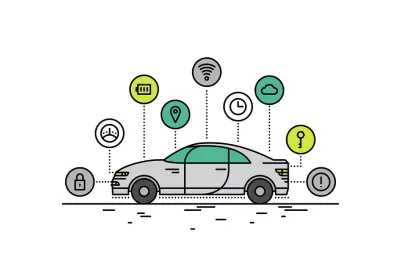As we have written about before, what is an “automotive” company is changing and companies like Uber, Lyft may disrupt the automotive industry. We have even considered what might be the focus of OEM’s going forward. But, we may be underselling just how disruptive things are within the industry. Morgan Stanley posits that private automobile ownership is on the verge of changing forever. The future is now according to Morgan Stanely, “a future of shared, fully electric, driverless cars on demand is closer to reality than it might appear.”
 No longer will we be talking about how many vehicles companies sell. Instead, we will analyze how many miles are driven. And, when we say “driven”, we do not mean by people. Morgan Stanley sees miles driven making a continuous steady climb for the next 15 years. Importantly, whereas right now 4% of all miles driven are in taxis, shared rides, etc., Morgan Stanley predicts that it will grow to 26% by 2030. Fully electric, autonomous, shared vehicles will eventually be cheaper per mile than automotive ownership. If you then factor in that the percentage of the world population is increasingly urban (vs. rural), it leads to the inevitable conclusion that fewer cars will be owned, meaning that fewer cars will be sold.
No longer will we be talking about how many vehicles companies sell. Instead, we will analyze how many miles are driven. And, when we say “driven”, we do not mean by people. Morgan Stanley sees miles driven making a continuous steady climb for the next 15 years. Importantly, whereas right now 4% of all miles driven are in taxis, shared rides, etc., Morgan Stanley predicts that it will grow to 26% by 2030. Fully electric, autonomous, shared vehicles will eventually be cheaper per mile than automotive ownership. If you then factor in that the percentage of the world population is increasingly urban (vs. rural), it leads to the inevitable conclusion that fewer cars will be owned, meaning that fewer cars will be sold.
One could argue that the world will still need vehicles to be shared. The problem with the argument is that the shared vehicles get used more efficiently. When I drive to work and park my car in the garage, it then sits there, unused, for 8-10 hours. If it is shared, it can do the work of multiple vehicles while I am working. Thus, fewer vehicles sold. Fewer vehicles owned. Fewer vehicles insured. Etc.
What does this mean for airlines? For public transportation? Why take the train or bus when I can hop in a shared, autonomous vehicle and go to work? Especially for shorter haul flights, why fly given the headaches and delays instead of ride (no one will be driving). Already, many people consider driving for trips 3-5 hours (or more). Imagine if that same trip can be done in an autonomous vehicle and spent working, or reading, or watching a movie. Interestingly, when Forbes considers what companies might be winners of this disruption, they are content, entertainment and technology companies such as Netflix, Facebook, Nvidia and Intel. After all, with hour after hour spent in a vehicle but not driving, we all need something to entertain us.




 />i
/>i

